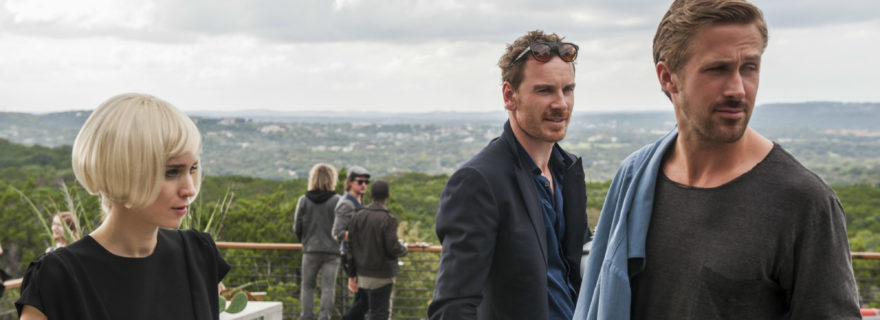'Song to Song'
Movie Rating:
2.5
Terrence Malick used to disappear for decades between movies and then return with something magical that was worth the wait. Sadly, he no longer seems interested in taking his time planning a film or even having much of an idea of what he’ll produce until he’s halfway through it. That’s painfully evident in his latest, ‘Song to Song’.
Malick’s films remain beautiful to look at and – thanks to the mixture of his legendary aura and experimental working methods that transform his productions into a dance between the cast and crew – he has zero problem assembling collections of movie stars to secure financing. Undoubtedly, he loves to make movies more often now because he’s landed on a style of filmmaking more amusing and less pressure-packed for him as an artist. While he’s found an intriguing new aesthetic within the semi-improvised productions of ‘To the Wonder’, ‘Knight of Cups’ and ‘Song to Song’, these movies are nowhere near as interesting or entertaining to watch as they must have been to make. I suppose there’s a chance that one day soon this loose and freewheeling version of Malick will stumble into a masterpiece that justifies all the faffing about. For now, however, the guy keeps throwing parties for his collaborators, and audiences are stuck standing in the corner watching those folks have fun while scratching our heads as to why we’ve even been invited.
Malick’s latest offering is set in the Austin music scene, and though you may find this hard to believe, it concerns lost and lonely souls wandering around looking thoughtfully into the distance while thinking deep thoughts in voiceover. Rooney Mara is kind of the protagonist in that she has the most screen time. She plays Faye, a struggling musician who’s dating a Ryan Gosling-shaped songwriter named BV. But then she hooks up with her old boss, stylish record executive Cook (Michael Fassbender). That’s obviously bad for all concerned, especially since Cook also has a trophy wife played by Natalie Portman. Throughout all this are endless music performances, though none from the main characters. Cate Blanchett wanders in for a bit. Val Kilmer appears briefly with a chainsaw. There are lots of shots of clouds, and plenty of voiceover that suggests a deeper meaning we can’t quite grasp.
There’s something deeply frustrating about these latest experiments from this enigma of a director. Their plots are barely even worth mentioning, and if Malick ever does write dialogue scenes for his cast to play, he mostly cuts around them and retains the moods rather than the words. The movies are beautiful on a technical level, of course. The brilliant Emmanuel Lubezki’s cameras float through scenes and capture images in mysterious ways. The footage is always edited with care to leave plenty of open abstract moments to plunge into for deep analysis.
This one seems to use cinema to capture the flurry of emotion in a fresh relationship and how that slowly dwindles into routines that can seem dull and disposable. It’s an intriguing theme that I can only guess was the focus by the ways that Malick shot and edited the picture, never through dialogue, plot, and certainly not voiceover. He tosses aside those conventional storytelling tools in favor of embracing pure cinema. Unfortunately, that leaves his famous actors with little to do and audiences with so little to grasp onto beyond the pretty pictures and how they intersect.
I have no doubt that Malick is enjoying his new experiments, given that he’s doubled his filmography over the last six years. The trouble is that the movies feel increasingly like projects crafted entirely for himself and his collaborators, not for viewers who will ever actually watch them. Although there’s nothing wrong with an artist following his own path without concern for the audience, Malick’s distinct images have less power with each frustratingly dull and seemingly tossed-off outing. His existential dilemmas aren’t particularly worth the effort it takes to discern them and his beautifully constructed images are feeling less vital without a form or focus to justify the efforts.
Perhaps Malick just needed to get a bunch of personal baggage out of his system while developing this new aesthetic. His upcoming project ‘Radegund’ sounds like a more substantial project thematically. Perhaps when the next chapter of his career kicks off with something worthy of the Terence Malick reputation, all these sloppy emo picture poems will feel worth it in the context of a lager career. Either that or the old guy has simply lost it and is just having fun while financers are still willing to let him get pretentious with movie stars. Only time will tell. For now, only those precious few who enjoyed Malick’s last few projects need to bother with ‘Song to Song’. Everyone else can just wait until they hear something new from camp Malick.




Chris B
I didn’t even bother to see Knight of Cups and I won’t bother with this one either. Like you said in your review, maybe Radegund will have Malick producing something that’s actually worth watching again.
Sergio
New title: “Songs about boredom”
Terrence Malick always has been, in my personal opinion, an overrated director.